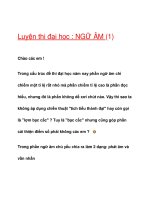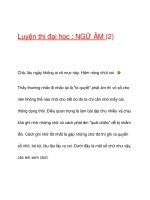ARTICULATORS (Ngữ Âm Âm Vị)
Bạn đang xem bản rút gọn của tài liệu. Xem và tải ngay bản đầy đủ của tài liệu tại đây (519.64 KB, 5 trang )
MINISTRY OF EDUCATION AND TRAINING
UNIVERSITY
SCHOOL OF SOCIAL SCIENCES AND
FOREIGN LANGUAGES
ESSAY
ARTICULATORS
Instructor:
Student:
Student code:
Class:
Subject: ENGLISH PHONETICS and PHONOLOGY
School year: HK2 (2020-2021)
Ho Chi Minh City, May 26th, 2021
SCHOOL OF SOCIAL SCIENCES and FOREIGN LANGUAGES
Academic Year: 2020- 2021
FINAL TEST
Student’s name:
Student’s code:
Class:
SCORE IN
FIGURES
SCORE IN WORDS
EXAMINER 1
EXAMINER 2
Write an essay with at least 300 words expressing your understanding
about topics:
What are the Articulators?
Essay:
All the sounds we make when we speak are the result of muscles
contracting. The muscles in the chest that we use for breathing produce the
flow of air that is needed for almost all speech sounds; muscles in the
larynx produce many different modifications in the flow of air from the
chest to the mouth. After passing through the larynx, the air goes through
what we call the vocal tract, which ends at the mouth and nostrils. Here the
air from the lungs escapes into the atmosphere. We have a large and
complex set of muscles that can produce changes in the shape of the vocal
tract, and to learn how the sounds of speech are produced it is necessary to
become familiar with the different parts of the vocal tract. These different
2
parts are called articulators, and the study of them is called articulatory
phonetics.
Articulators can be divided into two types:
The active articulator is the articulator that moves towards another
articulator in the production of a speech sound. This articulator moves
towards another articulator to form a closure of some type in the vocal tract,
such as the tongue.
The passive articulator is the articulator that remains stationary in the
production of a speech sound. Often, this is the destination that the active
articulator moves towards, such as the teeth, the hard palate and the
alveolar ridge.
Articulators above the larynx:
The pharynx is a tube that connects the larynx to the oral cavity. It is
divided into two: one part being the back of the oral cavity and the other
being the beginning of the way through the nasal cavity.
The soft palate (velum) is a position that allows air to pass through the
nose and the mouth. This can be touched by the tongue => velar consonants
(k, g).
3
The hard palate is often called the "roof of the mouth". You can feel its
smooth curved surface with your tongue. With the tongue close to hard
palate => palatal (j in "Yes").
The alveolar ridge is between the top front teeth and the hard palate. With
the tongue touching alveolar ridge => alveolar (t, d, n).
The tongue: It can be moved to different places and different shapes.
Subdivisions of the tongue: tip, blade, front, back and root.
Fig. 2 Sub-divisions of the tongue
The teeth (upper and lower): Sounds made with the tongue touching the
front teeth, such as English θ, ð, are called dental.
The lips are important in speech. Lips in contact with each other =>
bilabial (p, b) and Lip-to-teeth contact => labiodental (f, v).
The seven articulators described above are the main ones used in speech,
but there are three other things to remember. Firstly, the larynx could also
be described as an articulator - a very complex and independent one.
Secondly, the jaws are sometimes called articulators; certainly, we move
the lower jaw a lot in speaking. But the jaws are not articulators in the same
way as the others, because they cannot themselves make contact with other
4
articulators. Finally, although there is practically nothing that we can do
with the nose and the nasal cavity, they are a very important part of our
equipment for making sounds (what is sometimes called our vocal
apparatus), particularly nasal consonants such as m, n.
THE END
5









